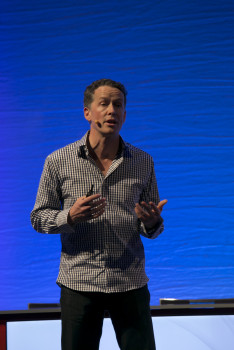Brain drain: what can advertisers do about shrinking attention spans?
 Technology is shrinking important parts of the human brain, so how can advertisers deal with that.
Technology is shrinking important parts of the human brain, so how can advertisers deal with that.
SXSW has a bit of a guilt thing happening this year – after years of successfully kick starting loads of tech and social into our lives, a price is being paid. On our brains.
A recurring theme is how endless stimulation from mobile apps, social and multitasking has taken its toll on how consumers think. Basically our brains are going backwards in terms of memory, ability to pay attention and ability for original thought.
Marketers have a tough job to reset advertising for a changed human brain and most of them seem oblivious to the fact that things have changed at all.
For the last few years we have been obsessing about the incredible multi screen, multitasking abilities of todays consumers. Or so we thought, a great session from UK outfit Hey Human seriously questioned this. In new research conducted by the University of Copenhagen consumers who were using mobile, web and TV simultaneously typically had cognitive overload and defaulted to one channel after a matter of minutes.
Apparently the brain, even in adulthood has high plasticity, which means that the brain quickly adapts to the high frequency low value stimulus we get each day (looking at your smartphone on average 150 times a day for example) Each time we get a little hit of dopamine and we love it. This means our shallow snack sized digital world has reshaped our brains for the worse.
Multitasking is actually more like Task Switching where we skim through things in our days, often never taking stuff in to our longer-term memory. Google is fast becoming the answer to the question, not our own memory: ‘who was that guy in that movie – you know…uuuum’

Chang
David Chang founder of Momofuku in his session on food and tech was highly critical of what the internet has done to original thought amongst chefs – basically every one copies each other and in general no one really engages their brain to come up with fresh ideas for eating.
For advertisers the wake up call is here. In the Copenhagen research 31 per cent of traditional advertising messages of any kind were recalled when consumers were trying (unsuccessfully) to multitask across 3 devices. If consumers are using one channel the recall figure went up to 92 per cent.
And it’s costing us, a Harvard Business Review piece of research shows that the average cost of engagement has increased by 20 per cent between 2010 and 2013.
My personal favourite stat on this stuff is the fact that according to the US Library of Medicine the average American’s transient attention span has decreased from 12 seconds in 2000 to just 8 seconds 2013.
A lot of sense around this challenge came from Jay Wilson, New York based director of tech for Sapient in a session called ‘The Human Brain and Innovation Overload’: “Stop thinking of brain overload as a problem and start embracing it, change what you do”
Brands need to change from just broadcasting elongated complex messages to embrace new thinking so they become more relevant. It could be as simple as new brevity where simplicity and context is everything. Or simple digital utility like reminder systems for birthdays and anniversaries through to more complex solutions like support in managing our lives and our brains.
Take Microsoft’s Cortana, an Intelligent Personal Assistant in the upcoming Windows 10 – it anticipates your informational needs based on your regular behaviour patterns.
There is no best practice yet for marketing to the changed human brain yet, its up to us to experiment and evolve.
We tend to over complicate our messaging in advertising already; maybe our shrinking brains will force us to finally get it right.
- Douglas Nicol is creative partner at The Works





People who live in glass houses…Shrinking attention spans is also a very real issue inside agencies. Luckily there are coping strategies for client meetings and such. I’ve isolated a few here would should prove useful.
https://petemontgomeryunpacks.wordpress.com/
User ID not verified.
Agree with the above – agencies should look internally for a good case study!
User ID not verified.
Thought provoking piece… Ta.
User ID not verified.
I’ve had an idea! Put on OFF button on the mobile. What’s that? There is one? Let’s use it more often – I know I do.
User ID not verified.
Can you please post link to University of Copenhagen research, can’t seem to find
User ID not verified.